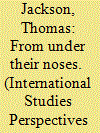| Srl | Item |
| 1 |
ID:
097067


|
|
|
|
|
| Publication |
2010.
|
| Summary/Abstract |
This article discusses the importance for armed groups of arms acquisition from government sources. It considers how arms transfers are treated by the "new war" and globalization literature, and how they focus on cross-border transfers at the expense of domestic procurement. Despite the attention given to the international arms trade, in reality it is by theft, ambush, and corruption that most rebel groups source weapons and ammunition. Evidence from conflicts around the world indicates a preference for this type of arms acquisition over foreign sources, in part because the importation of weapons requires money and sponsorship. Bringing together examples of conflicts where domestic procurement has been crucial, it highlights conditions that favor targeting government-sourced weapons, particularly during the early stages of a conflict. The article ends with a discussion of the policy implications of its findings.
|
|
|
|
|
|
|
|
|
|
|
|
|
|
|
|
| 2 |
ID:
092326


|
|
|
|
|
| Publication |
2009.
|
| Summary/Abstract |
If pyrrhic victory had an antonym, it would describe a loss with dramatic yet unanticipated benefits, a victory disguised as defeat. This essay's central assertion is the Vietnam War was a geopolitical victory for the United States. The war was a victory disguised as defeat. Nicholas Spykman's analysis of the United States' geopolitical position in America's Strategy in World Politics is applied along with older and post-Cold War Vietnam War historiography. Saul Cohen's maritime conception of the Cold War is also employed. The 1965 American ground force intervention in Vietnam geopolitically secured Indonesia in the Western strategic-economic orbit in the Cold War. The unanticipated benefit, making the Vietnam War pyrrhic victory's antonym, is the intervention's role in the movement of the Sino-American relationship from that of enemy to rapprochement to tacit alliance in the 1970s. This movement illustrates a recent historiographical assertion the war intensified communist bloc fractures beyond repair, reoriented international politics, and made a major contribution to the US Cold War victory.
|
|
|
|
|
|
|
|
|
|
|
|
|
|
|
|